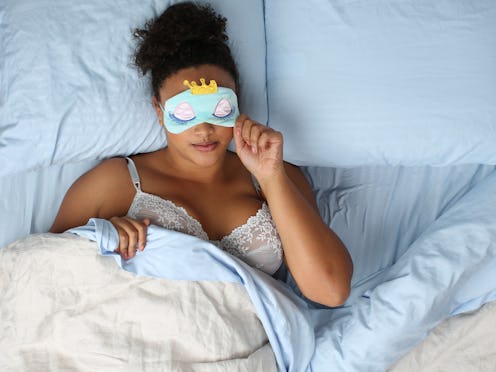
A new study answers a number of questions many of us have likely had upon waking: Why don't I remember my dreams? If I can't remember them, am I even still dreaming at all? And if I am... well, then what's stopping me from recalling them? While we can't say for sure whether everyone dreams every single night, the study, published in the Journal of Sleep Research, does indicate that we probably dream more than we realize.
To obtain an objective sign that people were dreaming, the researchers used 289 subjects with REM sleep behavior disorder, which leads them to engage in sleep-talking, sleepwalking, and other forms of dream enactment. After observing them while they slept, the study's authors gave out questionnaires asking people whether they dreamt or not. Even when they said they didn't dream, every single one of the participants showed signs that they actually were. One "non-recaller" was even found "arguing, swearing profanities, kicking, boxing and throwing items towards an invisible individual."
Sure, it's possible that these motions were not accompanied by dreams, but if we ask that question, we're speculating on people's subjective experiences — the realm of philosophy more than science. Plus, one study found that the brain activity of people who remember their dreams is different from that of people who don't, but the difference was in areas related to memory, not to dreaming itself. So, it's most likely that we dream even when we don't remember it.
Why don't we remember our dreams more often, then? Here are a few possible factors that can make you forget your dreams and what you can do to be more aware of what's going on in your subconscious.
1. You're just less responsive to your environment overall.
One study showed that the brains of people with the best dream recall also respond more strongly to hearing their names when they're awake. The authors aren't sure why, but it could have something to do with the fact that they're more likely to wake up in response to noises.
2. You're a heavy sleeper.
People who wake up more during the night are also more likely to remember their dreams, which, in my opinion, is not necessarily a problem to be fixed. I'd trade in my dream recall for a good night's sleep any day.
3. You're taking sleeping pills.
Medications like Ambien affect how much time you spend in REM sleep (the phase of sleep when dreams occur) rather than your recall, so in this case, your lack of memory could actually correspond to a lack of dreaming itself.
4. You're not making a point to remember them.
If you're really serious about getting in touch with your subconscious, you can try keeping a dream journal and writing in it immediately after you wake up. I did this at one point and was shocked by how much I forgot throughout the day; I'd look back at my journal (or listen to myself recounting my dreams on my phone's voice recorder when I was too lazy to write) and not even remember writing it. It can also help just to mentally make a note of your dream right when you wake up. You can put a post-it note on your alarm clock to remind yourself to do this.
5. You're using an alarm clock.
You could also be forgetting your dreams because your alarm clock jolts you out of them, eliminating that half-asleep state where you wake up with your dreams still in mind. I've definitely noticed that I remember fewer dreams when I use an alarm clock than when I wake up naturally.
Many of these contributors to dream-forgetting seem pretty unavoidable, so maybe you're better off making peace with your lack of dream recall and just being grateful that your nightmares have been wiped from your memory.
Images: Bustle Stock Photo; Giphy (5)